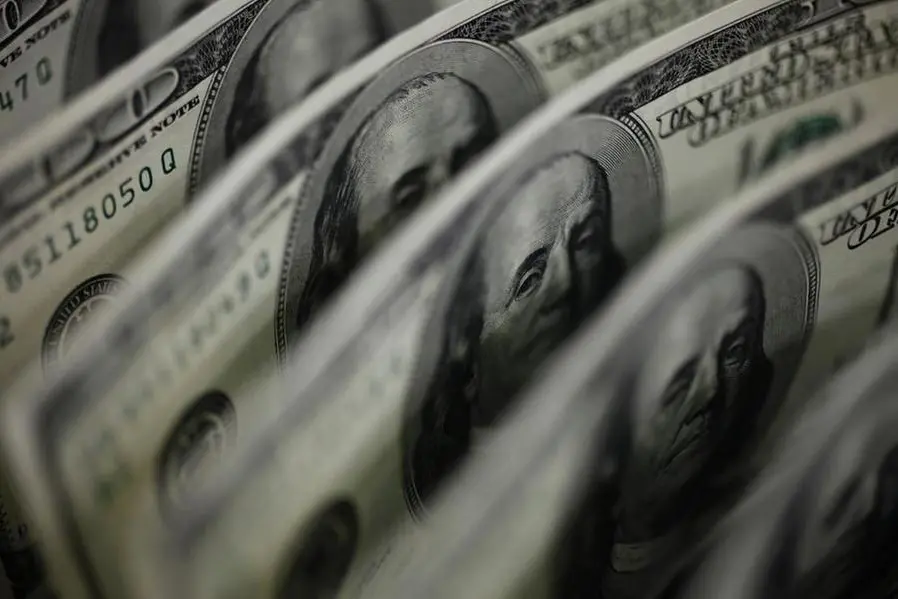PHOTO
The dollar eased from near 5-1/2-month highs on Wednesday as Federal Reserve officials reiterated the rate-cutting cycle was on hold pending new economic data, while the monetary easing outlook for major central banks was roughly unchanged.
Top U.S. central bank officials, including Fed Chair Jerome Powell, backed away on Tuesday from providing fresh guidance on when interest rates may be cut, saying instead that monetary policy needed to be restrictive for longer.
Recent data shows the U.S. economy remains stronger than expected, leading investors to reduce their bets on future rate cuts. Meanwhile, risks of a broadening Middle East conflict have added to the dollar's safe-haven appeal in the short term.
Powell "needed to come back into the center. He was definitely one of the more dovish voices out there," said Marvin Loh, senior macro strategist at State Street in Boston. "He can't afford to be the outlier when he's the chairman."
After last week's hotter-than-expected report on the U.S. Consumer Price Index (CPI), the market has reduced the number of quarter-point interest rate cuts by the Fed this year to less than two, with the first likely in September.
A more hawkish view on interest rates has pushed U.S. yields higher and strengthened the dollar's outlook as the market consolidates prices around the current range.
"We pushed everything as hard as we could for now, which means from a yield perspective and a higher dollar perspective, we'll consolidate and trade around the range," Loh said. "We did build a lot of hawkishness over the course of the last six weeks."
The dollar index, a measure of the U.S. currency against six major trading peers, was down 0.14% and the euro rose 0.2% to $1.0638. The dollar index is up about 4.8% year-to-date, while the euro is down roughly 3.7%.
Some analysts said they were still bullish on the greenback at the current levels.
"On any escalation of the Middle East crisis, we would expect the U.S. dollar to benefit from safe-haven flows," said Jane Foley, senior forex strategist at Rabobank, who confirmed the target for the euro/dollar at 1.05.
The U.S. and its allies planned fresh sanctions against Iran over its unprecedented attack on Israel, seeking to dissuade Israel from a major escalation as its war cabinet was set to meet again on Wednesday to decide a response.
European Central Bank policymakers continued to make the case for an interest rate cut in June on Tuesday as inflation remains on course to ease back to 2% by next year, even if the path for prices still proves bumpy.
YEN WORRIES
The yen strengthened 0.03% at 154.67 per dollar, just below 154.79 per dollar, its weakest level in 34 years.
Market participants raised the bar of a possible intervention by the Bank of Japan (BOJ) to prop up the Japanese currency, now mentioning the 155 level from the previous 152, even if they believed the BOJ could step in at any time.
They flagged that the latest fall in the Japanese currency was in line with fundamentals, reflecting the pricing of Fed policy, and that authorities were analysing not just the recent yen declines but factors that were driving the moves.
"We think that the potential for BoJ to intervene to bolster the yen appears less evident, given that the dollar is strengthening on a relatively more hawkish Fed," said Yvan Berthoux, forex strategist at UBS Investment Bank.
Market participants believe that as long as the fall in yen is gradual and led by fundamentals, the probability of a BOJ intervention is low.
"Rhetoric from officials has been more focused on speed of a move rather than levels themselves," said Kieran Williams, head of Asia FX at InTouch Capital Markets.
Japan last intervened in the currency market in 2022, spending an estimated $60 billion to defend the yen.
Hedge funds have built up their biggest bet against the yen in 17 years, raising the prospect that when Japan's embattled currency does rebound, the short-covering rally could be a powerful one.
(Reporting by Herbert Lash, additional reporting by Stefano Rebaudo, Ankur Banerjee in Singapore; Editing by Sam Holmes, Jacqueline Wong, Ros Russell, Alex Richardson and Deepa Babington)





















